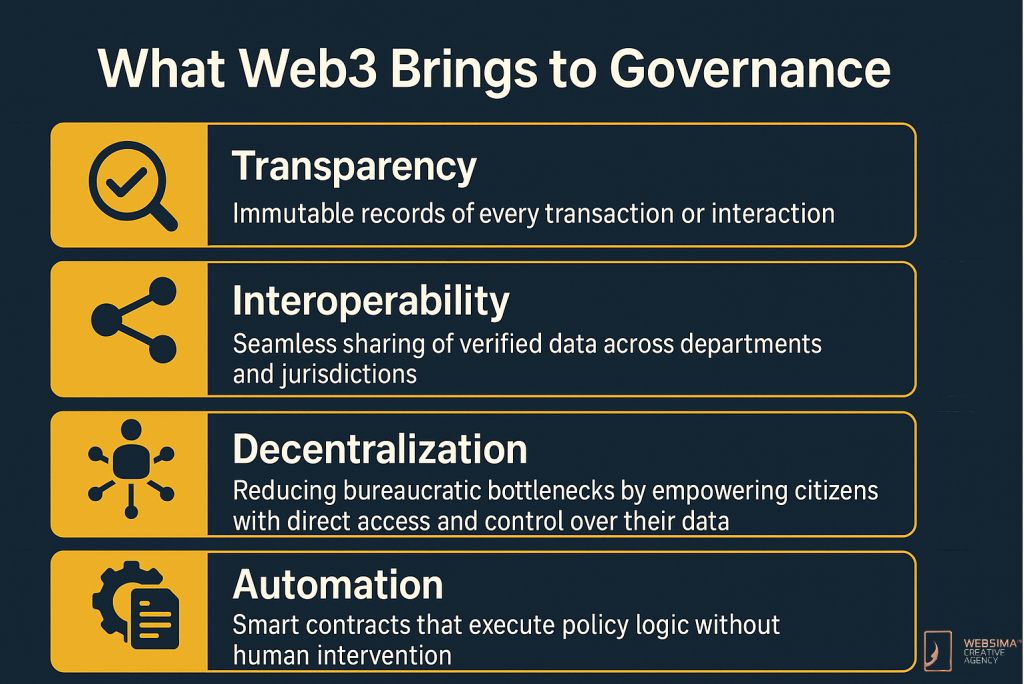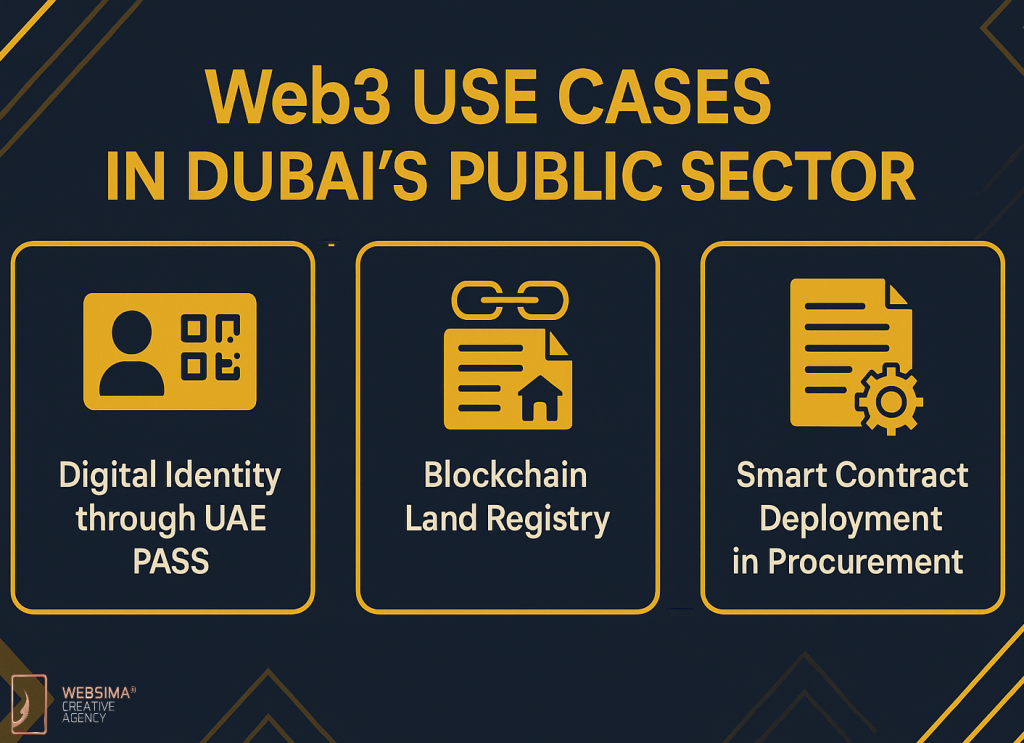Introduction: Dubai’s Vision for Web3-Enabled Governance
Dubai, a global innovation hub, is forging ahead in its ambition to become the first fully blockchain-powered government. Central to this transformation is the city’s embrace of Web3 technologies, which underpin a new era of decentralized, transparent, and citizen-centric digital governance. Through a blend of strategic planning, robust infrastructure, and public-private collaboration, Dubai is creating a future where governance is not just digitized, but democratized. The purpose of this article is to provide a comprehensive overview of how Web3 digital governance Dubai is evolving—from strategy and implementation to real-world applications and investor opportunities. This transformation isn’t only reshaping government operations but also fueling the growth of startups and enterprises through enterprise-focused Web3 integration.
The Strategic Foundation: Dubai Blockchain Strategy
Dubai’s finance department signs MOU with https://t.co/odYCkTfAST to enable crypto payments for government services https://t.co/pF40swN5NC
— The Block (@TheBlock__) May 13, 2025
In 2016, Dubai launched the Dubai Blockchain Strategy, a joint initiative by Smart Dubai and the Dubai Future Foundation. The goal was to migrate 100% of applicable government transactions to blockchain platforms by 2020. While ambitious, this initiative laid the groundwork for Dubai’s broader Web3 vision, focusing on three core pillars:
- Government Efficiency: Utilizing blockchain to streamline operations and reduce paper-based processes.
- Industry Creation: Encouraging startups and enterprises to innovate using blockchain.
- International Leadership: Positioning Dubai as a pioneer in blockchain-based governance.
According to Digital Dubai, the successful deployment of these initiatives has saved hundreds of millions of hours in manual documentation and continues to increase transparency across public services.
What Web3 Brings to Governance
Web3 is the next evolution of the internet—a decentralized framework powered by blockchain, smart contracts, digital identity, and tokenization. When applied to governance, Web3 enables:

- Transparency: Immutable records of every transaction or interaction.
- Interoperability: Seamless sharing of verified data across departments and jurisdictions.
- Decentralization: Reducing bureaucratic bottlenecks by empowering citizens with direct access and control over their data.
- Automation: Smart contracts that execute policy logic without human intervention.
Web3 is integrating into Dubai smart city initiatives and digital governance, as these principles are being applied in sectors such as real estate, health, law enforcement, and city planning.
Web3 Use Cases in Dubai’s Public Sector

1. Digital Identity through UAE PASS
Launched to enable secure access to government services, UAE PASS acts as the cornerstone of decentralized identity. This digital identity allows residents to:
- Sign contracts remotely
- Authenticate across federal and local government portals
- Access over 6,000 public and private services
The identity is blockchain-secured, ensuring that users maintain ownership of their personal data while facilitating cross-border e-governance partnerships.
2. Blockchain Land Registry
Dubai Land Department (DLD) has implemented blockchain to manage title deeds and property transactions. Citizens can verify the authenticity of real estate ownership and transactions through a secure ledger, drastically reducing fraud and inefficiencies.
This approach has led to increased investor confidence and attracted blockchain-based real estate platforms.
3. Smart Contract Deployment in Procurement
Dubai’s Department of Finance uses smart contracts to automate public procurement. These contracts execute terms autonomously once predefined criteria are met. The result is:
- Faster processing times
- Fewer administrative errors
- Higher trust in award transparency
There are several other popular use cases of Web3 in Dubai that are gaining traction and will be introduced to the market as going forward,
VARA: Legal and Regulatory Framework for Web3 Governance
The establishment of VARA (Virtual Assets Regulatory Authority) in 2022 marked a significant milestone in digital governance. VARA governs the use of digital assets, blockchain platforms, and related services.
According to VARA’s official site, licensed projects must adhere to regulations concerning:
- Data protection
- Cybersecurity
- Smart contract audits
- Anti-money laundering (AML) compliance
This legal framework offers startups clarity and confidence, accelerating innovation in sectors like finance, public services, and healthcare.
Public-Private Partnerships Advancing Governance
Collaboration is central to Dubai’s Web3 model. Government entities actively partner with technology firms, both global and local.
- Shiba Inu and UAE Ministry of Energy: A high-profile partnership exploring blockchain use in utilities and infrastructure.
- ZIGChain’s Shariah-compliant RWA platform: Developed in Dubai, it supports decentralized finance (DeFi) and public infrastructure projects using tokenization.
Such collaborations help fast-track proof-of-concept deployments into full-scale solutions that benefit both citizens and government agencies.
Startups, Innovation, and the Web3 Economy
The Web3 push has turned Dubai into a hotspot for startups. Incubators like:
- Crypto Oasis
- DIFC Innovation Hub
- DMCC Crypto Centre
…offer seed funding, mentorship, and networking opportunities. Web3 governance applications have attracted startups in:
- Voting platforms
- Public records tokenization
- Civic engagement apps
- DAO-based budgeting and governance
These platforms give citizens a say in community decisions, echoing Web3’s ethos of democratization.
Citizen-Centric Governance: Putting Power Back in People’s Hands
One of the key goals of Web3 digital governance Dubai is to place the citizen at the heart of every process. Through tokenized participation, smart city dashboards, and open-data platforms, residents can:
- Vote on local initiatives
- Access environmental and budget data in real time
- Report infrastructure issues via decentralized apps
This shift moves Dubai away from a service-provider model to a citizen-partner governance structure.
Cybersecurity and Ethical Considerations
While decentralization offers many advantages, it also requires stronger protocols for data integrity and cybersecurity. VARA has mandated the use of zero-knowledge proofs, multi-signature wallets, and routine smart contract audits to prevent vulnerabilities.
Ethically, the city ensures that:
- Smart contract logic aligns with Shariah principles
- Data ownership remains with individuals
- Algorithms used in governance are auditable and transparent
Global Implications and Replicability
The Web3 digital governance Dubai model is being closely watched by global cities. The combination of:
- Government-led innovation
- Public-private ecosystems
- Legal support
…makes it a replicable template for nations seeking to modernize governance.
From Estonia to Singapore, lessons from Dubai’s experiments are informing policy labs worldwide.
The Road Ahead: Dubai 2030 and Beyond
By 2030, Dubai aims to:
- Be fully cashless
- Integrate AI and IoT into all Web3 systems
- Run city governance through token-based incentive models
The city’s Web3 future may soon include:
- DAO-managed city councils
- Tokenized utility services
- Real-time, citizen-run referendums
As these innovations unfold, Dubai’s model may redefine how societies manage identity, power, and responsibility.
Build the Future of Governance with Websima
At Websima, we help startups, enterprises, and government organizations design, develop, and deploy blockchain and Web3 solutions that align with Dubai’s smart governance vision.
Our Specialties Include:
- Smart Contract Development for civic and enterprise use cases
- Decentralized ID and credential platforms for public sectors
- DAO Structuring for participatory governance
- VARA Compliance & Technical Documentation
- Web3 Wallet and Token Architecture
Whether you’re launching a startup in civic tech or working on a next-generation voting app, Websima ensures your project is secure, scalable, and compliant.
Get in touch with Websima to start shaping tomorrow’s governance today.





